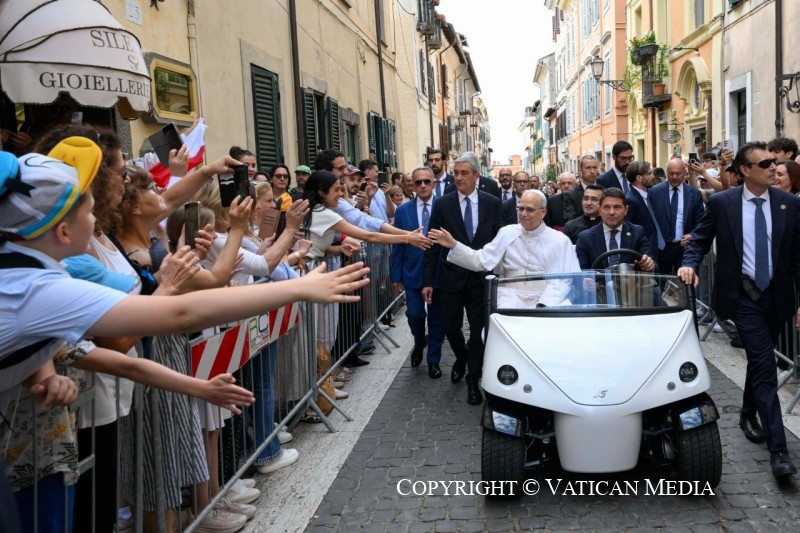Leo XIV: “So many people stripped bare: see them, don't pass them by”
Prevost in Castel Gandolfo celebrated Mass in the parish of St Thomas of Villanova. His homily on the parable of the Good Samaritan: the need for a “revolution of love”; peoples “victims of oppressive political systems, of an economy that forces them into poverty, of war”. At the Angelus: “Do not forget to pray for peace”.
Rome (AsiaNews) - Exactly one week ago, at the end of the Angelus in St. Peter's, Pope Leo XIV announced he would be spending a 'short period of rest’ in Castel Gandolfo, a village in Lazio not far from Rome.
Today he appeared in public for the first time, welcomed by the festive town - the historic residence of the popes - which saw Benedict XVI as the last pontiff to stay there.
After the Angelus, recited in Piazza della Libertà, the pope thanked everyone for the ‘warm welcome’ and asked them not to forget to pray for peace, ‘for all those who, because of violence and war, find themselves in a state of suffering and need.’ Like the man on his way to Jericho who was beaten by robbers in the parable of the Good Samaritan in today's Gospel.
Before the Marian prayer, Pope Leo XIV celebrated Mass - flanked by Cardinal Michael Czerny, prefect of the Dicastery for Promoting Integral Human Development - in the parish of St Thomas of Villanova in Castel Gandolfo.
This is not far from the Apostolic Palace, the papal residence opened to the public by Bergoglio. During his homily, the pontiff, in front of a small number of faithful, commented on today's Gospel (Lk 10:25-37), which contains the famous parable of the Good Samaritan.
It is a story that ‘continues to challenge us today, questions our lives, shakes the tranquillity of our dormant or distracted consciences, and provokes us against the risk of an accommodating faith,’ he emphasised. It is a teaching that places “compassion” at its centre and makes us reflect on the condition of ‘so many dispossessed peoples’.
It is the “gaze” that the passage from Luke's Gospel focuses on from the outset. It tells of the priest and the Levite who “saw” the half-dead man who had fallen into the hands of robbers “and passed by” (v. 32). And then of the Samaritan who, instead, “saw him and had compassion on him” (v. 33). ‘The gaze makes the difference, because it expresses what we have in our hearts: we can see and pass by, or we can see and feel compassion,’ said Pope Leo.
In his homily, he distinguished between two types of gaze: one that is ‘external, distracted and hurried,’ and one that ‘touches us, shakes us, questions our life and our responsibility.’ ‘The Good Samaritan [...] is first and foremost an image of Jesus, the eternal Son,’ he added, who looked ‘at humanity without passing by, with his eyes, with his heart, with his bowels of compassion and mercy.’
Like the man beaten by robbers, ‘humanity was descending into the abyss of death.’ And even today, it ‘must contend with the darkness of evil, with suffering, with poverty, with the absurdity of death.’
‘God, however, looked upon us with compassion, wanted to make our way himself, descended among us and, in Jesus, the Good Samaritan, came to heal our wounds, pouring out upon us the oil of his love and mercy,’ he said. ‘Today we need this revolution of love.’
The road that man travels, ‘from Jerusalem to Jericho,’ ‘is the road travelled by all those who sink into evil, suffering and poverty.’ It is ‘the road of many peoples who have been stripped, robbed and plundered, victims of oppressive political systems, of an economy that forces them into poverty, of war that kills their dreams and their lives.’
Jesus, therefore, overturns the perspective of seeing and passing by, "presenting us with a Samaritan, a foreigner and a heretic who becomes a neighbour to that wounded man. And he asks us to do the same,‘ added Leo XIV.
What truly brings people close to one another is, in fact, ’seeing without passing by, stopping our busy rush, letting the life of the other, whoever he may be, with his needs and sufferings, break our hearts."
Pope Leo concluded that an act of human closeness "generates true brotherhood, breaks down walls and fences. And finally, love makes room for itself, becoming stronger than evil and death."
07/02/2019 17:28







.png)










